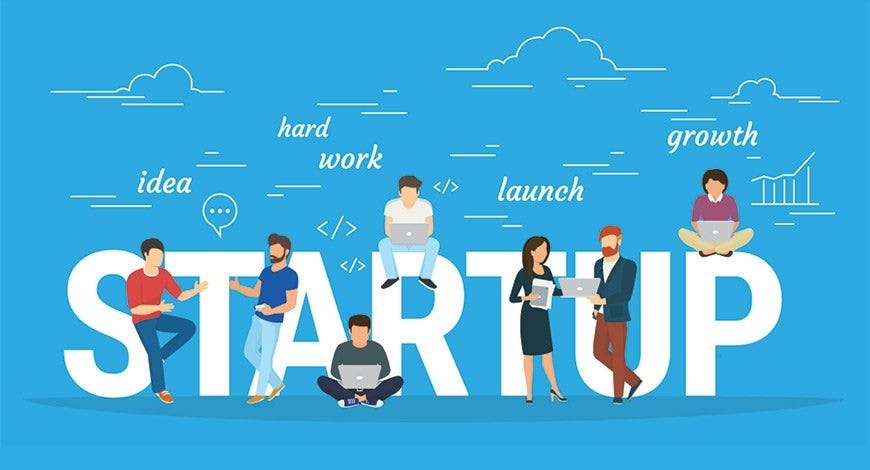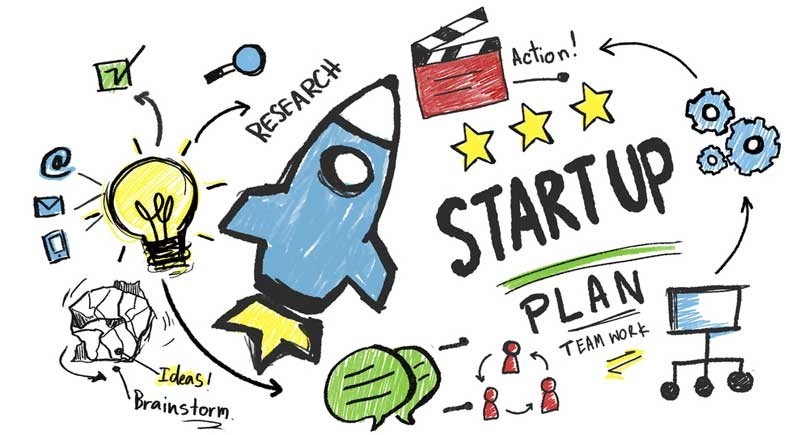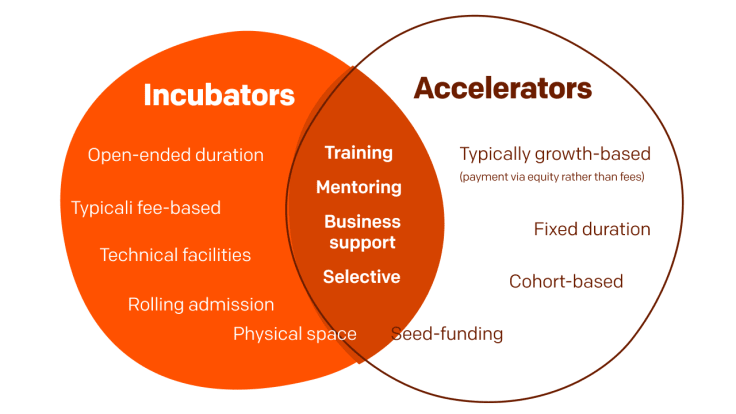When you’re launching a startup, choosing the right type of support can make a world of difference. Two popular models that entrepreneurs often turn to are incubators and accelerators. While they may sound similar and serve somewhat comparable functions, they differ in structure, goals, and the kind of support they offer. Understanding these differences is crucial for choosing the best path for your startup’s growth.
In this post, we’ll break down the key distinctions between incubators and accelerators, and help you figure out which one is the right fit for your venture.
What is an Incubator?

An incubator is a support program designed to help early-stage startups develop and refine their ideas. Incubators typically provide resources such as office space, mentorship, networking opportunities, and sometimes funding—often in a less structured, longer-term format compared to accelerators.
Incubators are focused on nurturing startups through the idea or product development phase, where they may still be experimenting and refining their business model. It’s about creating an environment where companies can grow and evolve, even before they have fully figured out their market fit.
Key Features of Incubators:
- Longer Timeline: Incubators usually have a much longer duration than accelerators. Startups can be in an incubator for a year or more, depending on their stage of development.
- Flexible Program: Incubators tend to be less structured and offer flexibility. Startups may not have a defined start or end to their time in the incubator.
- Early-Stage Focus: Incubators are designed to support early-stage ventures that may still be in the ideation phase or just beginning to develop a product. The focus is on helping founders refine their ideas, prototypes, and business models.
- Comprehensive Support: The incubator often provides resources such as office space, access to labs or equipment, mentorship from experienced entrepreneurs, and networking opportunities. The goal is to foster long-term growth and create a solid foundation for the startup.
- Equity Models: Many incubators take an equity stake in exchange for their resources and support, though this can vary. However, equity stakes are generally smaller compared to accelerators.
Pros of Incubators:
- Nurturing Environment: Incubators are great for startups that need time and space to experiment, iterate, and develop their product.
- No Immediate Pressure: Since there’s no time limit on participation, incubator programs allow for a relaxed pace, which is ideal for startups that need time to develop their product-market fit.
- Networking and Community: Incubators provide a supportive community of fellow entrepreneurs, mentors, and industry experts that can be invaluable for making connections.
Cons of Incubators:
- Slow Pace: The flexible timeline might sometimes lead to a lack of urgency, which could result in startups taking longer to hit key milestones.
- Resource Limitation: While incubators may provide office space and some resources, they often don’t offer as much funding or access to investors as accelerators do.
What is an Accelerator?

Accelerators, on the other hand, are fast-paced, high-intensity programs designed to help startups rapidly grow and scale their business in a short amount of time. These programs typically last 3 to 6 months and culminate in a “demo day” where startups pitch to investors, potential customers, and other stakeholders.
Accelerators usually target startups that already have a product or service and need to refine their business model, accelerate growth, or prepare for fundraising. The focus is on getting companies ready to scale quickly and succeed in the market.
Key Features of Accelerators:
- Shorter Duration: Accelerator programs are intense, typically lasting anywhere from 3 to 6 months. The goal is to rapidly accelerate a startup’s growth in a short time.
- Structured Program: Accelerators offer a more structured, time-limited approach with clear milestones. They usually provide a set curriculum, mentorship, and specific goals for each stage of the program.
- Growth-Oriented: Accelerators are designed for startups that have already developed a prototype or MVP (minimum viable product) and are now focused on scaling, user acquisition, and securing funding.
- Funding and Investment: Most accelerators provide seed funding in exchange for equity. They also have strong connections to venture capitalists and investors, which can help accelerate the startup’s growth after the program ends.
- Demo Day: At the end of the program, accelerators typically hold a “demo day” where startups pitch their business to a room full of investors, media, and other stakeholders. This is a key opportunity for startups to secure funding and gain visibility.
Pros of Accelerators:
- Fast Growth: Accelerators are ideal for startups looking to rapidly scale, gain market traction, and attract investors.
- Access to Investors: With a built-in network of investors and industry experts, accelerators often provide startups with significant exposure and access to funding.
- Structured Environment: The structured nature of accelerators ensures that startups stay focused on achieving their key milestones, increasing the chances of success.
Cons of Accelerators:
- Intense Pace: The short duration and high expectations can be overwhelming for some startups, especially those still refining their product or business model.
- Equity Loss: Accelerators typically require startups to give up equity in exchange for funding and support, which could be a concern for founders looking to retain control of their business.
Which One Is Right for You?

Choosing between an incubator and an accelerator depends largely on where your startup currently stands and what kind of support it needs.
When to Choose an Incubator:
- You’re Early in the Development Stage: If your startup is still in the ideation or early prototyping phase, an incubator is likely the better option. Incubators offer more flexibility and longer timelines, allowing you to develop your product at your own pace.
- You Need Comprehensive, Ongoing Support: If you need resources like office space, lab equipment, or long-term mentoring, an incubator can provide a more supportive environment.
- You’re Focused on Product and Market Fit: If you need time to iterate and refine your product before scaling, an incubator gives you the space to do so without the pressure of an accelerator’s fast timeline.
When to Choose an Accelerator:
- You’re Ready to Scale: If your startup already has a product and is looking for rapid growth, customer acquisition, and investment, an accelerator is the right environment. Accelerators are designed to push you toward scaling quickly and effectively.
- You Need Investment: If you’re seeking seed funding and want access to a network of investors, accelerators provide that opportunity through their funding rounds and demo days.
- You Thrive in a Structured Environment: If you’re looking for a fast-paced program with a clear structure and timeline, an accelerator is ideal. It will push you to meet key milestones quickly, often culminating in funding opportunities and scaling.
Conclusion: Incubator or Accelerator?
Ultimately, the choice between an incubator and an accelerator comes down to where your startup is in its journey and the type of support you need. If you’re at the beginning of your entrepreneurial journey and need time and space to develop, an incubator could provide the right environment. If you’re ready to scale rapidly, secure funding, and take your business to the next level, an accelerator might be the best fit.
Whichever path you choose, both incubators and accelerators provide invaluable resources and networks that can help you navigate the complex world of startups. The key is to understand your startup’s current needs, growth trajectory, and the type of mentorship and resources that will best support your goals.




